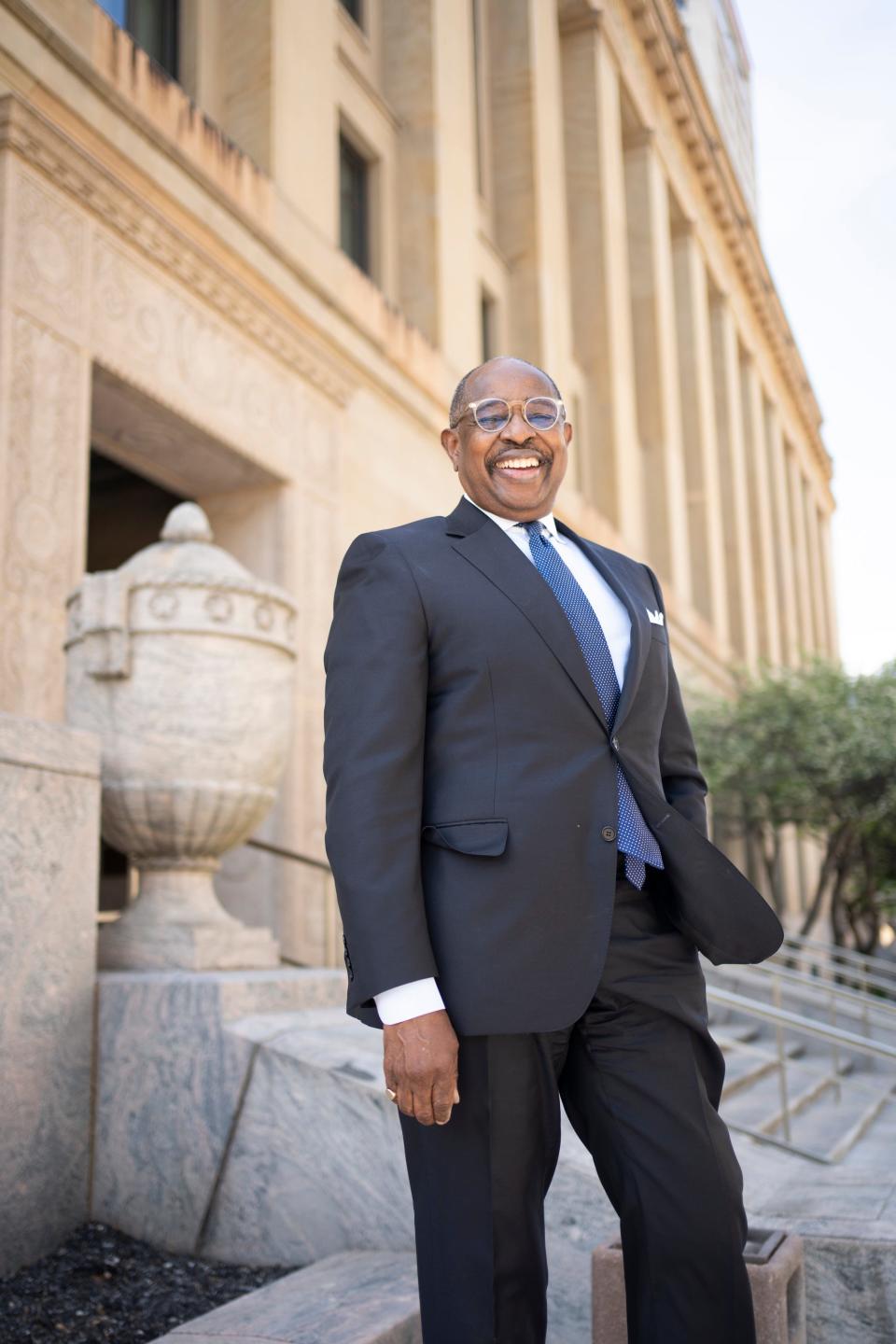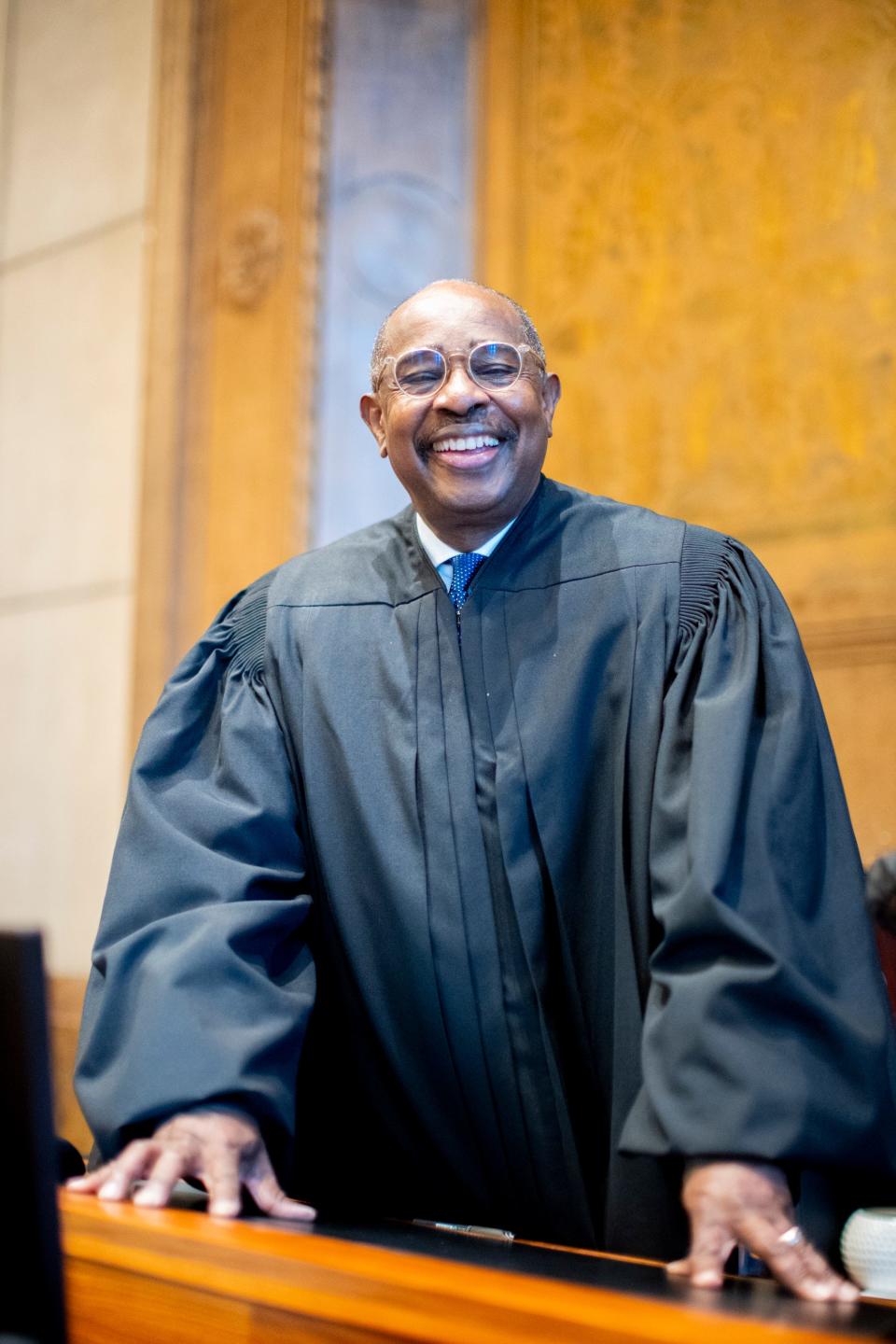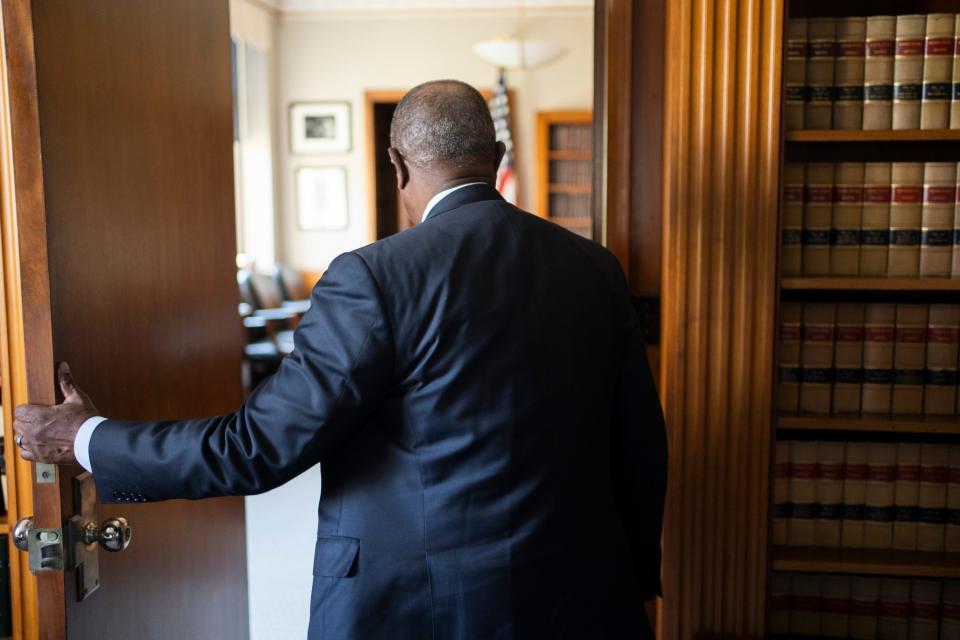U.S. District Judge Algenon Marbley slowing down after storied career
“Democracy dies in the dark,” U.S. District Judge Algenon L. Marbley famously said in 2012 in a Columbus courtroom during a voting rights case.
Does the quote sound familiar? In 2017, The Washington Post adopted the slogan "Democracy Dies in Darkness.”
Some news outlets have reported that the slogan is a variation of Marbley’s quote, while others have pointed to a 2002 First Amendment case in which Judge Damon J. Keith, of the 6th U.S. Cicuit Court of Appeals in Cincinnati, wrote: “Democracy dies behind closed doors.”
Legendary Washington Post investigative reporter Bob Woodward, who reported on the Watergate scandal, used the phrase for years before 2017 and said he got it from a judge, but couldn’t recall who.
“I'm just glad that sentiment is expressed,” Marbley said. “I don't need attribution. It is important that people understand that sentiment because we’re the world’s first and foremost multiracial constitutional democracy. And it must continue to evolve, but it must continue to evolve without abandoning democratic principles.”
Voting rights is an issue close to his heart, he said, because he grew up under Jim Crow, what he calls American apartheid, in North Carolina.
Last month, Ohio State’s Office of Diversity and Inclusion inducted Marbley into its third Hall of Fame class.
When President Bill Clinton nominated Marbley in 1997 to a seat on the U.S. District Court for the Southern District of Ohio, Marbley was only the second African American judge in the district. In 2019, he became the first African American to serve as chief judge for the district.
In September, Marbley will turn 70 and have to relinquish the chief judge position due to age restrictions. He’s also preparing to take senior status, a kind of semi-retirement for federal judges during which he’ll be able to take on fewer cases. Marbley notified President Joe Biden in October 2023 that upon the confirmation of his successor, he would take senior status.

Reflecting on a storied career that includes voting rights and fair housing cases, Marbley told The Dispatch he hopes every person who came before him in his court feels like he “treated their case as the most important case in the federal system.”
“As long as I will go down as a judge who was fair and relentless in my pursuit of justice, I'll rest easy at the end of my career,” he said.

Lawyers who practiced before him or worked with him told The Dispatch Marbley is always fair. They also described him as charming, intelligent and a workaholic dedicated to serving the community and parties before him in court.
“I probably had more trials in front of him than anybody,” said Dave DeVillers, a former U.S. Attorney for the Southern District of Ohio who now practices as a defense attorney. “Not all of his rulings went my way. But you walk out of Marbley’s courtroom, and you know your side got a fair trial. … He works harder than anybody. He’ll be up at two in the morning writing opinions while you’re in bed. He outworks you.”
Attorneys emphasized to The Dispatch that Marbley’s decisions are often quoted because they’re “masterful and brilliant,” as Alycia Broz, one of Marbley’s first law clerks put it. He throws out Latin every once in a while in court, DeVillers added.
“In Marbley, the public got a public servant who’s dedicated and committed, and it just doesn’t get much better than that,” said Larry James, an attorney who’s practiced in front of Marbley, but has also been a longtime friend.
Still, Marbley has found time to be active in the Columbus community. He currently serves on the boards of Nationwide Children's Hospital, the KIPP (Knowledge Is Power Program) School, and the Columbus Symphony.
He previously was on the Ohio State University board of trustees, but he resigned after the Ohio Ethics Commission questioned the lawfulness of him serving as a trustee while receiving payment to teach as an adjunct professor at OSU's Moritz College of Law. Marbley also agreed to teach for free for two semesters.
In his spare time, Marbley is an avid golfer.
Primarily, he said he’s a family man dedicated to his wife, two adult sons, stepson, three granddaughters and two dogs. His first grandson is on the way.
A storied career: voting rights, housing rights, policing and the Short North Posse
Although Marbley insists every case is important, there are cases of his that stand out.
The 2012 case in which Marbley said “democracy dies in the dark” involved then-Ohio Secretary of State Jon Husted’s office on the eve of the 2012 election issuing an order concerning provisional ballots.
The Northeast Ohio Coalition for the Homeless argued Husted’s order violated a previous consent decree and disenfranchised voters. Marbley would side with the coalition.
Even more from Judge Marbley: Judge blocks Ohio law requiring parental permission for kids to use social media
In 2021, Marbley granted a preliminary injunction that barred Columbus police from using tear gas, pepper spray, wooden bullets and other “non-lethal force” against nonviolent protesters. The decision favored protesters who alleged they were abused by officers during 2020 demonstrations against racial injustice after George Floyd’s murder. The city later adopted Marbley's rationale and passed a city ordinance barring officers from using these tactics during protests.
Marbley sentenced many members of the Short North Posse, a gang that terrorized Weinland Park. In 2016, he presided over a nearly three-month jury trial of five Short North Posse members that included 11 defense attorneys, nine murders, 120 criminal allegations and more than 150 witnesses. The jury found them guilty on all counts.

In 2008, Marbley presided over a fair housing case involving allegations that African American residents in the Coal Run neighborhood on the edge of Zanesville were discriminated against when the city and Muskingum County denied them city water access for 50 years. A jury awarded more than 60 plaintiffs over $10 million.
And Marbley likely isn’t done with precedent-setting cases. Last year, Marbley made a ruling that allows for survivors of sex trafficking across the country to file in his court against the nation’s largest hotel chains for allegedly allowing exploitation under their roofs. Those cases are still pending.
Chief judge in a global pandemic
According to Senior U.S. District Judge Susan J. Dlott, Marbley is the best chief judge the district has ever had. More than any other chief, he has increased the diversity among court staff, Dlott said.
Dlott was appointed in 1995 to a seat on the bench in the U.S. District Court for the Southern District of Ohio, which includes Columbus. That was just before Judge Edmund A. Sargus Jr. in 1996 and Marbley in 1997. Dlott told The Dispatch the three are like siblings.
Marbley calls Dlott his “sister from another mother.”
Dlott and Sargus both served as chief judge of the district before Marbley since the post is based on seniority. Dlott said she and Sargus made sure to give up their positions before they reached their term limits so that Marbley would have a chance to serve as chief judge before he turned 70 and became ineligible.
While Dlott and Sargus faced their own challenges as chief judge, Dlott said Marbley had it the worst since he took over months before the COVID-19 pandemic hit.
Marbley said he had no idea what Zoom was before 2020. But he worked hard to keep court staff and the public safe while keeping cases moving using tools like Zoom and plexiglass dividers in the courtroom.
How Algenon Lamont 'Monte' Marbley turned to the law
Algenon Lamont (“Monte”) Marbley’s parents told him he was named after Algernon Lee Butler, a federal judge in North Carolina where Marbley grew up.
But that’s likely revisionist history since Marbley was born in 1954, five years before Butler took the bench. Marbley said his parents knew he wanted to be a lawyer — that or a baseball player, but his body didn’t “cooperate” — and wanted to encourage him.
Marbley became interested in the law early on because he wanted to change the world around him. Growing up in a small town during segregation, Marbley remembers being forced to sit in the balcony at the movie theater, go in the back of a restaurant for carry-out and attend separate schools from white children.
When David Duke, grand wizard of the Ku Klux Klan, came to speak at Marbley’s college, the University of North Carolina at Chapel Hill, he and the Black Student Movement, a group he chaired, shouted Duke off the stage.
“We decided that he represented an existential threat to the Black students because of the violent history of the Klan. And in North Carolina that violent history was real, it wasn’t an academic abstraction,” Marbley said.
Marbley could have been expelled, but a student court decided 4-3 to exonerate Marbley.
Marbley was able to go onto law school at Northwestern University and worked as a lawyer in Chicago until he moved to Columbus and spent 17 years at the law firm of Vorys, Sater, Seymour, and Pease.

Growing up, Marbley witnessed different ways to fight injustice. He saw Martin Luther King’s peaceful protests and the more radical methods of the Black Panther Party.
Ultimately, Marbley was inspired by the likes of Thurgood Marshall, who argued the Brown v. Board of Education, case and other attorneys like him.
“As I got older, it became apparent to me that the way to effectuate lasting change was through the law,” Marbley said.
This article originally appeared on The Columbus Dispatch: Algenon Marbley, Southern District of Ohio's first Black chief judge


